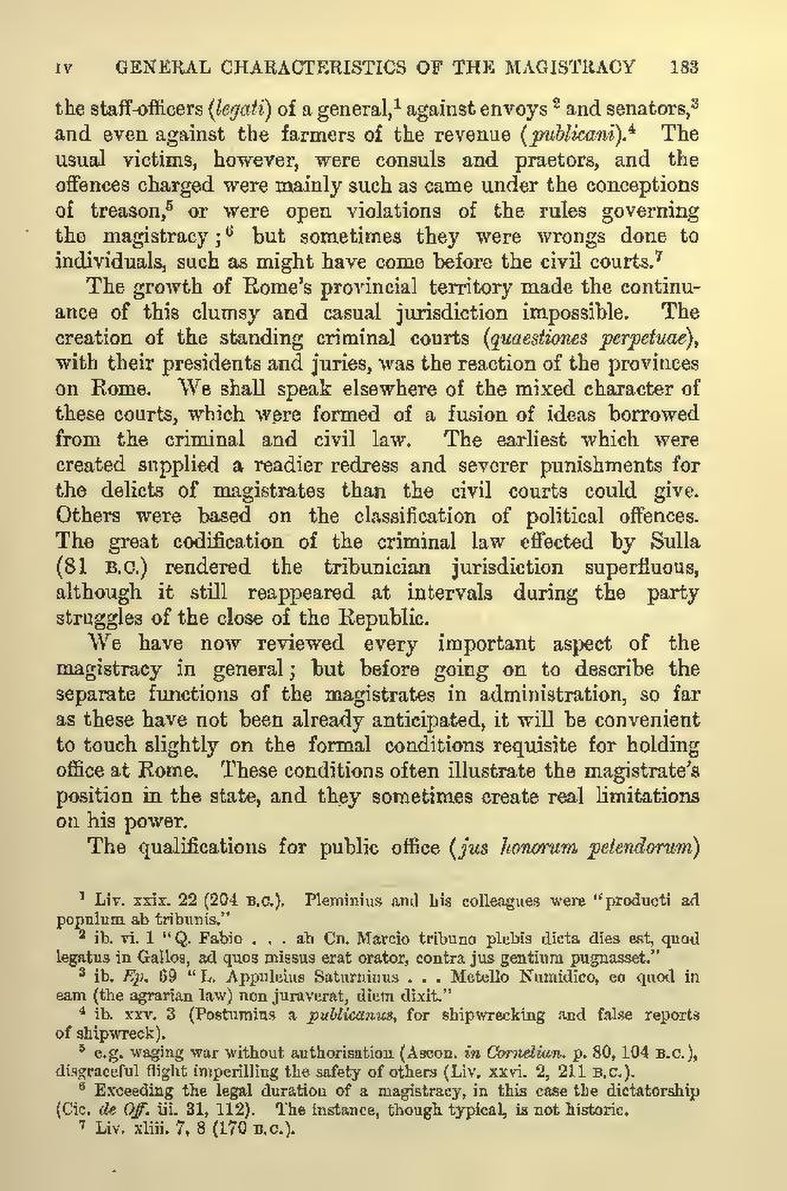the staff-officers (legati) of a general,[1] against envoys[2] and senators,[3] and even against the farmers of the revenue (publicani).[4] The usual victims, however, were consuls and praetors, and the offences charged were mainly such as came under the conceptions of treason,[5] or were open violations of the rules governing the magistracy;[6] but sometimes they were wrongs done to individuals, such as might have come before the civil courts.[7]
The growth of Rome's provincial territory made the continuance of this clumsy and casual jurisdiction impossible. The creation of the standing criminal courts (quaestiones perpetuae), with their presidents and juries, was the reaction of the provinces on Rome. We shall speak elsewhere of the mixed character of these courts, which were formed of a fusion of ideas borrowed from the criminal and civil law. The earliest which were created supplied a readier redress and severer punishments for the delicts of magistrates than the civil courts could give. Others were based on the classification of political offences. The great codification of the criminal law effected by Sulla (81 B.C.) rendered the tribunician jurisdiction superfluous, although it still reappeared at intervals during the party struggles of the close of the Republic.
We have now reviewed every important aspect of the magistracy in general; but before going on to describe the separate functions of the magistrates in administration, so far as these have not been already anticipated, it will be convenient to touch slightly on the formal conditions requisite for holding office at Rome. These conditions often illustrate the magistrate's position in the state, and they sometimes create real limitations on his power.
The qualifications for public office (jus honorum petendorum)
- ↑ Liv. xxix. 22 (204 B.C.). Pleminius and his colleagues were "producti ad populum ab tribunis."
- ↑ ib. vi. 1 "Q. Fabio . . . ab Cn. Marcio tribuno plebis dicta dies est, quod legatus in Gallos, ad quos missus erat orator, contra jus gentium pugnasset."
- ↑ ib. Ep. 69 "L. Appuleius Saturninus . . . Metello Numidico, eo quod in eam (the agrarian law) non juraverat, diem dixit."
- ↑ ib. xxv. 3 (Postumius a publicanus, for shipwrecking and false reports of shipwreck).
- ↑ e.g. waging war without authorisation (Ascon. in Cornelian. p. 80, 104 B.C.), disgraceful flight imperilling the safety of others (Liv. xxvi. 2, 211 B.C.).
- ↑ Exceeding the legal duration of a magistracy, in this case the dictatorship (Cic. de Off. iii. 31, 112). The instance, though typical, is not historic.
- ↑ Liv. xliii. 7, 8 (170 B.C.).
